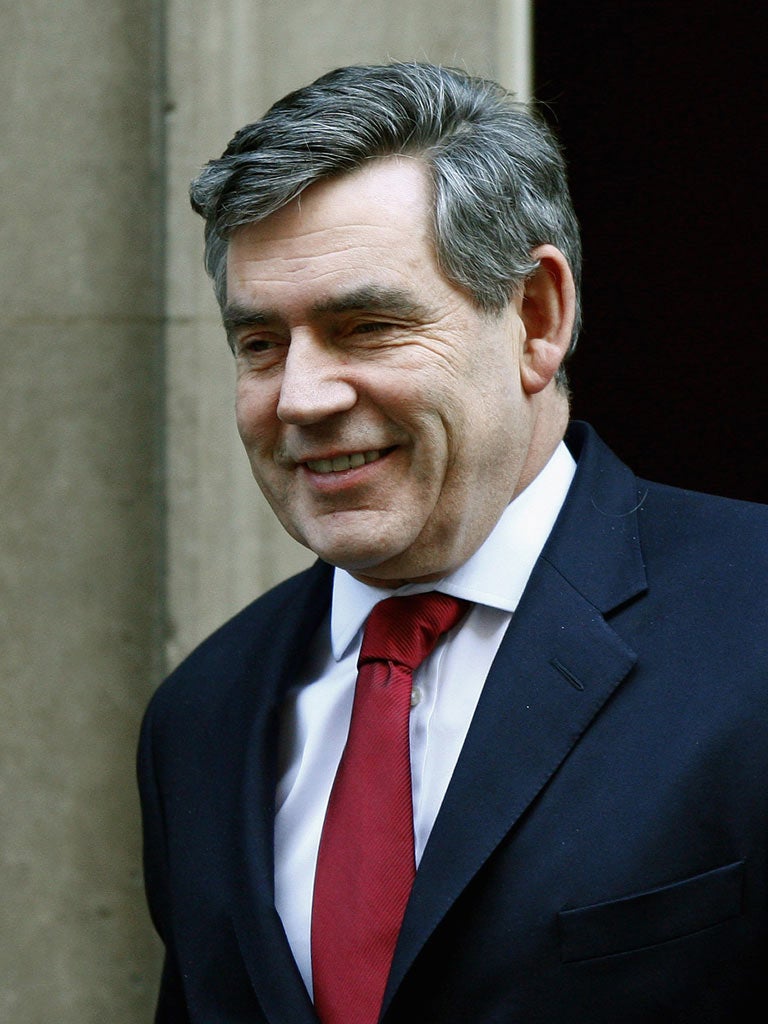Diary: Brown's concerted effort is not music to everyone's ears

Your support helps us to tell the story
From reproductive rights to climate change to Big Tech, The Independent is on the ground when the story is developing. Whether it's investigating the financials of Elon Musk's pro-Trump PAC or producing our latest documentary, 'The A Word', which shines a light on the American women fighting for reproductive rights, we know how important it is to parse out the facts from the messaging.
At such a critical moment in US history, we need reporters on the ground. Your donation allows us to keep sending journalists to speak to both sides of the story.
The Independent is trusted by Americans across the entire political spectrum. And unlike many other quality news outlets, we choose not to lock Americans out of our reporting and analysis with paywalls. We believe quality journalism should be available to everyone, paid for by those who can afford it.
Your support makes all the difference.Gordon Brown is on a restless search for new ways to make himself useful and save the world, but his latest scheme is not looking like a winner.
Speaking at an education conference in Doha yesterday, the former prime minister let on that he has been talking with Simon Fuller, creator of Pop Idol and American Idol, and with Kevin Wall, of Live Earth, about whether they could organise a concert that would do for education what Live Aid has done for poverty.
Speaking of the need to "force the pace" of education in some of the world's poorest countries, Mr Brown said: "We must use every form of mass media and every form of entertainment. I have asked Kevin Wall, who did Live Earth, and Simon Fuller, who has been involved with American Idol, 'How do we organise events around the world that are global events that can raise the profile of education?'"
Messrs Fuller and Brown have been in contact for years. The former prime minister paid tribute to Fuller in The Hollywood Reporter earlier this year when he was inducted into the Hollywood Walk of Fame.
But the latest idea to emerge from their friendship did not impress Elizabeth King, the education director of the World Bank. She told The Independent: "We have our own funding mechanisms. We have one for the poorest countries which gives either zero-interest loans or straight grants to the poorest countries. The other one is for the richer countries. Those are the instruments we have that we use. We are not putting funds into other funding mechanisms."
Mr Brown also suggested: "We should now create a global fund for education in the same way that we have a global fund for health that has made enormous advances in tuberculosis and HIV Aids and, of course, in polio and malaria. That would allow people in the private sector and the public sector, philanthropic [people] and people in charities and private companies to affiliate."
That did not go down well with Ms King either. "A global fund cannot be as big as the resources that countries themselves spend on education, except probably for the poorest and smallest countries," she said. "A global fund? Why take it away from countries and put it in a place that is not under the direct control of countries?"
The perils of playing Churchill
Playing great men can be hazardous to your health, to judge from an interview with the actor Robert Hardy, above, who turned 86 at the weekend, in Country Life magazine. Describing one of several occasions when he played Winston Churchill, he said: "I'd only just recovered from cancer and there I was smoking three cigars each performance, eight times a week."
Throwaway remark on refuse
The good people of Enfield, in north London, have taken to recycling with exemplary enthusiasm, says Councillor Chris Bond, the local cabinet member for the environment, though he adds: "I'd urge them to think long and hard about whether it's really suitable to put a blow-up doll in their recycling."
Among the other items that have turned up in green wheelie bins which should not be there were vibrators, used sanitary towels, an urn containing ashes, and a box of live maggots. One wrong item missed by the staff can set the council back £1,000 in landfill charges.
Peers told of spiritual side
Witches and sacrificial goats are two subjects that would seem tangential to government policy for the welfare state, and yet Dr John Sentamu, the Archbishop of York, mentioned both as peers debated the Health and Social Care Bill.
His Reverence objected to the term "physical and mental illness", which recurs in the Bill. Illness, he said, "can be physical or mental, but it can also be spiritual."
To illustrate the point, he told a tale from his days as a young vicar, when he was informed of a "presence" in a house in his south London parish which had a young girl frozen with terror for about three weeks, leaving a doctor, a psychiatrist and a psychologist baffled. The young priest went to investigate.
"I asked how the girl had got into that difficult state. Somebody said that they had been to a witches' coven where a goat had been sacrificed and the young girl was absolutely petrified that she would be sacrificed next," he revealed.
Dr Sentamu said a prayer, anointed the girl with oil, and lit a candle. The next day, he had a call to say that she had recovered the power of speech.
"That was not mental or physical illness; there was something in her spirit that needed to be set free," he concluded.
Join our commenting forum
Join thought-provoking conversations, follow other Independent readers and see their replies
0Comments